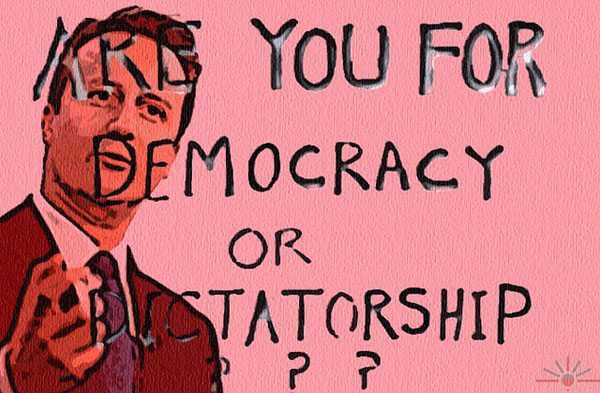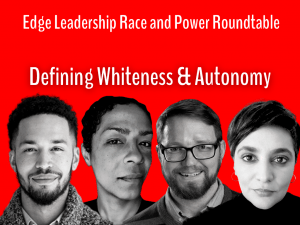
April 18, 2018; The Nation
NPQ has written much over the years on governance, including a key piece republished earlier this year, “Reframing Governance II,” which David Renz begins with, “Many members of the nonprofit world have expressed concern that the sector has not developed new forms of governance.” He blames the sector’s lack of focus on governance on its narrowing of the broad function to the specific structure of nonprofit boards. This, he implies, leads to an underestimation of our real collective democratic negotiating power, but a new article in the Nation warns of the danger of not acting quickly now.
The Nation’s Donna Minkowitz writes about the nine to 17 (depending on how we define the term) white nationalists currently running for elected office. Whether or not they win, the Western States Center’s Eric K. Ward writes, “They are, by their very presence, shifting the pole of what most Americans find to be acceptable political discourse.”
Of course, this phenomenon is attributed to Trump, who Minkowitz credits with “reengaging white supremacists in the political system.” This political engagement of what used to be a fringe demographic has radically shifted the Overton window, “a term that describes the range of ideas that the mainstream media deem politically acceptable.”
Minkowitz quotes Spencer Sunshine, a researcher and writer of the far right, as saying “White nationalists’ milieu is super-violent, so any rise in their movement [will be] accompanied by violence.”
We have already seen a spike in racist attacks since Trump’s election. Minkowitz writes, “According to a study by the Anti-Defamation League’s Center on Extremism, white supremacists killed 18 people in 2017, around double the number from the previous year; meanwhile, hate crimes in major cities jumped 20 percent in the same year, according to the Center for the Study of Hate and Extremism at California State University, San Bernardino.”
Further, “As the line separating Trumpists from white nationalists grows finer, the president’s radical policies—such as ending the admission of most refugees, detaining pregnant women in ICE facilities, and seeking to curtail legal immigration—are increasingly being seen as reasonable political decisions.” In fact, “The public conversation around immigration in particular has shifted so far to the right that it’s almost unrecognizable from the mainstream discussions four years ago.”
Not only do electoral campaigns build the base and raise money, which would in turn advance the development of political infrastructure of the right, they force the left to live in defense mode, effectively preventing advancement on the issues many nonprofits care about. Ward says, for example, “If the real issue is the lack of living-wage jobs in a community, a white-nationalist candidate can derail that by turning it into a discussion of immigration.”
Minkowitz warns, “White-nationalist candidates can transform the discussion from community needs to the supposed oppressions visited on white people.” She concludes if the left can’t build a “multiracial, multiregion movement for economic justice,” we will not be able to protect ourselves or the country “from the dangers posed by the white-supremacist movement.”
Interestingly, a recent Atlantic article titled “When Terrorists and Criminals Govern Better Than Governments” posits that the true cause of the disorder that is ravaging the world right now is the absence of effective governance. The authors write,
People seek out governance from whoever can deliver it, and if the state cannot, they’ll find somebody else to do the job.
Sign up for our free newsletters
Subscribe to NPQ's newsletters to have our top stories delivered directly to your inbox.
By signing up, you agree to our privacy policy and terms of use, and to receive messages from NPQ and our partners.
[…]
Within the broad category of “governance,” there is a common thread that sticks out across regions, religions, and cultures: the demand for justice.
Renz offers hope when he notes,
We have created the “new nonprofit governance” at a new level within our communities. But we have not identified this shift because we’re so focused on the artifact that we know as “the board.”
[…]
It has become increasingly necessary to develop alliances and coalitions—extraorganizational entities—to address the multifaceted complexity of [our communities’] critical needs and issues. And the most successful systems we’ve developed to govern these alliances reflect the same scale and complexity as the alliances themselves. These systems of leadership mirror the design of social movements, with the fluidity and responsiveness that characterize the most effective of these movements.
However, in another NPQ article on governance, “The Road Less Traveled: Establishing the Link between Nonprofit Governance and Democracy,” Chao Guo writes that, in spite of the renewed interest in nonprofit governance in recent years, one of the interesting questions that has spawned almost no research is “the link between nonprofit governance and democracy.” Guo goes on, “Relatively little attention has been paid to democratic and critical approaches that look into the embedded power dynamics that influence who is allowed access to organizational decision making: whose voices get heard and whose get left out.”
While, as Guo asserts, voice and inclusion at the board level is important, an even more overlooked and perhaps more important omission is the everyday work experience of nonprofit staff. As Carole Pateman argues in Participation and Democratic Theory, the workplace is one of the most important sites for adult learning of not only the skills of participation so necessary for democracy, but political efficacy, which she describes as the “confidence in one’s ability to participate responsibly and effectively.” She explains, “Of ‘crucial significance’ for the development of the sense of political efficacy are opportunities to ‘participate in decisions at one’s place of work.’” At the generous end, staff participate in organizational-level decisions; at the least, staff has decision making power over how they do their work.
Take a look at your organization’s leadership culture. Does it support participation in decision making, or does it ask staff to suck up toxic culture or “stay in their place” in pursuit of social goals? We can no longer afford to tolerate the domination leadership styles that often characterize our sector and throw us out of alignment with our missions. Those small, everyday anti-democratic, anti-participatory acts accumulate and contribute both to the challenges we are here to solve and democracy.
Guo points out that the failure to link nonprofit governance to democracy is reflected in the theory and practice of nonprofit governance, which is “strongly influenced by research on corporate governance.” Pateman suggests what is possible when we instead see our core social spheres—home, school, and work—as places where we learn to participate in democracy.—Cyndi Suarez













